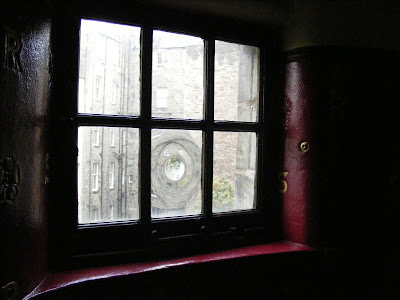Right. I was going to tell you about the tour we took. Perhaps I should explain about tour operator type holidays. They are the simplest, sometimes cheapest way to book a holiday if you know just what you want, but there are caveats. For one, soon after arrival everyone is expected to attend a meeting with the tour rep for your hotel. Expected might be too strong a word, but they will hunt you down and ensure that everything is OK, etc., etc., if you don't show up; it's easier just to go and get it out of the way.

The presentation is always longer than you want, full of hokey jokes and the point of it is to sell you tours: a boat ride, a bus trip to a market, a camel ride, Greece dancing - with broken plates - and dinner in a warehouse on the other side of the island, and so on. You also get a bit of local information, some recommendations for places to eat, how to negotiate a taxi fare, whether the public transport is reliable, where to buy English food if you don't like foreign stuff, usually a map of some kind and the all important hours the rep will be on site if you have any complaints or problems. They used to bribe folks to attend by serving free - and often nasty - alcohol, but the recession has obviously hit the tourist industry which is perhaps just as well in this case.
After the meeting they pretty much let you alone, bar leaving cute little notes under your door hoping you're having a great time or notes about your departure time and such.
Tour reps, rightly or not, are generally reputed to have round heels, probably because they tend to be single. Though they wear smart uniforms, I've never yet seen one not baked and bleached to a crispy, wrinkled future and looking like they've packed a lot of experience into their relatively short lives. That said, they all seem to be very organised and on top of meeting your needs. Being based in a foreign country for six months at a time must be similar to military service, only without the violence (bar a few drunk tourists), the retirement package or the respect. I'm certain they work quite hard for a small paycheck with only sun-and-vodka-drenched perks.

Anyhow, at our meeting where our poor guy, Colin, was competing with the loud music from the pool bar, Bill decided on a boat trip and a bus ride. That particular boat trip turned out not to be available, so he took another. The second was later cancelled due to rough seas, so we gave it up. The bus ride is what I'll be telling you about - and it turned out to include a short boat ride!

We met with other members of the tour at the top of the road. The coach took us up to the top of the island (north-wise and elevation-wise) on a number of switchback roads. At one of the turns we were invited to admire the goat population found there. At a certain vantage point it was recommended we disembark and take pictures of the view, which we all duly did. I felt a bit like herded cattle at that point, but the weather was pleasant so I didn't mind, really. Turned out also to be a 'comfort stop' before we took a ride in a glass-bottomed boat. We had time for an ice cream while we waiting for our boat to come, something I've not had in I don't know when.
The glass-bottom was of limited use unless we were in a cave because of light reflection. The main attraction of the trip was to show us some caves where there were pretty turquoise lights, caused by the sun reflected off the chalk and limestone underwater.
We've done this before somewhere; Malta, perhaps. All the while I was clicking away part of me thought this was a daft thing to do, but was also blessing digital technology, pitying the film developing industry and enjoying the warm weather.
The young boat driver looked liked he had the job from heaven driving from cave to cave. Besides turquise reflections there were interesting boats on the water, as well as buildings on the cliffs above us. I decided that if I was going to start being cynical I might as well just stay at home. There were stories about some of the caves, something about priests and smuggling, but I didn't follow it all.
Our boat trip concluded just about the time the clouds and the air cooled a bit; we'd had the best part of the day and I didn't envy the folks in the next boat load.
That was just the first portion of our tour, so more coming up soon!






















































